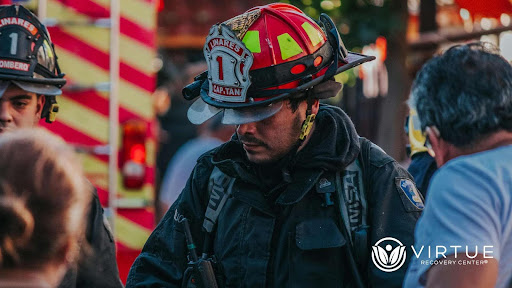Key Takeaways:
- First responders are at a much higher risk of going back to drinking because they have been through trauma many times and have mental health problems that aren’t being treated, like PTSD and depression.
- Integrated, trauma-focused therapies (e.g., Cognitive Processing Therapy, Prolonged Exposure) along with addiction-specific care are essential for recovery.
- Relapse prevention strategies, including therapy, skill building, medication, and peer support, need to begin immediately to ensure lasting sobriety.
- To find the best rehabs, seek programs that understand both addiction and trauma, offer treatment for co-occurring disorders, maintain confidentiality, and provide support tailored to first responder culture.
- Long-term sobriety requires ongoing support, family involvement, and understanding of what to say or do when someone relapses on alcohol.
Introduction
First responders need alcohol addiction treatment because they are often exposed to traumatic events, high stress, grief, and moral injury. Firefighters, paramedics, police officers, and emergency medical services (EMS) workers frequently carry a significant psychological burden. Without proper care, alcohol may be used to self-medicate. Unfortunately, once sobriety is achieved, trauma-based triggers can lead to frequent relapse if not carefully managed.
In this scenario, treatment must go beyond general recovery. It must address both substance use and the underlying trauma that contributes to it. For first responders, untreated PTSD or depression is a persistent risk factor. Therefore, effective alcohol addiction treatment must include detoxification, Trauma Therapy Program interventions, relapse prevention strategies, and ongoing mental health support.
What Unique Challenges Do First Responders Face In Trauma-Driven Relapse?
First responders are constantly exposed to life-threatening situations such as fatal accidents, violent crime, sudden death, and disasters. These incidents can result in PTSD, anxiety, depression, sleep problems, and hyperarousal. Individuals experiencing these mental health issues often develop substance use disorders; for example, alcohol may be used to numb emotional pain, quiet intrusive memories, or aid sleep. Research indicates that individuals with PTSD exhibit significantly higher rates of alcohol use disorder.
Triggers—including strong emotional reactions, trauma reminders, and workplace stress—can cause relapse if not addressed effectively. Additionally, stigma, shift work, fear of job consequences, and cultural norms like “tough it out” often delay first responders from seeking help, which the Pennsylvania Department of Health also observed.
How Does Evidence-Based Treatment Set Up Relapse Prevention?
Relapse prevention is a cornerstone of effective addiction treatment. Medical sources indicate that Relapse Prevention Therapy should include:
- Skills training: recognizing high-risk situations, stress management, and developing coping mechanisms.
- Medications: prescribed for alcohol use disorder to reduce cravings and withdrawal risks.
- Monitoring and ongoing assessment: care based on early warning signs.
- Peer support, group therapy, and family involvement: strengthening social support networks.
What Types Of Programs Or Rehabs Work Best?
When seeking help, first responders should look for the best rehabs, which are those that:
- Treat co-occurring disorders, not just addiction. Trauma-focused therapies such as Cognitive Processing Therapy (CPT) are crucial, as per the U.S. Department of Veterans Affairs..
- Include a Trauma Therapy Program to address both trauma and addiction, not only abstinence.
- Employ staff who understand first responder culture and can assist with licensing or job-related concerns.
- Integrate relapse-prevention tools from day one, teaching coping strategies, recognizing triggers, and guiding what to say to someone who relapses on alcohol.
What to Say or Do When Someone Relapses?
When seeking help, first responders should look for the best rehabs, which are those that:
- Treat co-occurring disorders, not just addiction. Trauma-focused therapies such as Cognitive Processing Therapy (CPT) are crucial, as per the U.S. Department of Veterans Affairs..
- Include a Trauma Therapy Program to address both trauma and addiction, not only abstinence.
- Employ staff who understand first responder culture and can assist with licensing or job-related concerns.
- Integrate relapse-prevention tools from day one, teaching coping strategies, recognizing triggers, and guiding what to say to someone who relapses on alcohol.

What to Say or Do When Someone Relapses?

Relapse does not indicate failure; it signals the need for more support or a treatment adjustment. When interacting with someone who has relapsed on alcohol, the following strategies are recommended:
- Listen without judgment, expressing care and concern rather than disappointment.
- Encourage professional help again, possibly through a more comprehensive program offering both addiction treatment and Trauma Therapy Program components.
- Reinforce the value of Relapse Prevention Therapy and reconnect them with support networks.
- Help explore why the relapse occurred: trigger, unresolved trauma, or insufficient coping skills.
Provide assistance with practical tasks: finding treatment options, connecting with peer groups, or contacting resources like Virtue Recovery Houston.
Conclusion
First responders require more than traditional alcohol addiction treatment. Any serious recovery plan must address ongoing trauma, integrate relapse prevention, provide co-occurring mental health treatment, and incorporate culturally competent care. Without these elements, relapse is highly probable.
Virtue Recovery Houston offers specialized, compassionate, and effective treatment for first responders facing trauma-driven relapse. Immediate action is vital—call now for support at Tel: 713.234.6254.
FAQs:
1. How often do first responders relapse after getting help for alcohol addiction?
Relapse is common, particularly when trauma and PTSD remain untreated. A significant proportion of those with PTSD also meet criteria for alcohol use disorder, increasing relapse risk.
2. Why is it important to treat PTSD and substance use disorder simultaneously?
PTSD and alcohol use disorder mutually exacerbate each other. Treating both concurrently through integrated, trauma-focused therapies improves outcomes.
3. What kinds of therapy work best to prevent relapse?
Trauma Therapy Program modalities such as CPT, Cognitive Behavioral Therapy, and Relapse Prevention Therapy, along with medications, peer support, and monitoring, are highly effective.
4. How can first responders find the best rehabs?
Seek treatment centers offering trauma-informed care, co-occurring disorder treatment, confidentiality, understanding of first responder culture, and relapse prevention from the start.
5. What legal or work-related concerns might first responders face when seeking treatment?
Concerns include job security, licensing, and credentialing. Confidential rehabs and employee assistance programs help protect privacy under HIPAA and other regulations.
Citations:
U.S. Department of Veterans Affairs. Treatment of Co-Occurring PTSD and Substance Use Disorder in VA: Practice Recommendations. VA PTSD: National Center for PTSD – Providers. https://www.ptsd.va.gov/professional/treat/cooccurring/tx_sud_va.asp.
U.S. Department of Veterans Affairs. Reducing Relapse Risk. VA Whole Health Library. https://www.va.gov/WHOLEHEALTHLIBRARY/tools/reducing-relapse-risk.asp.
U.S. National Institute on Mental Health. Conceptualization, Assessment, and Treatment of Co-Occurring PTSD and Substance Use Disorders among First Responders, etc. (PMC article). https://pmc.ncbi.nlm.nih.gov/articles/PMC6624844/.
Pennsylvania Department of Health. First Responder Addiction and Connection to Treatment (FR-ACT) Program. Office of Drug Surveillance and Misuse Prevention. https://www.pa.gov/agencies/health/programs/opioids/fr-act.html.








